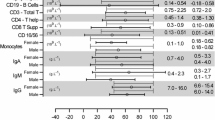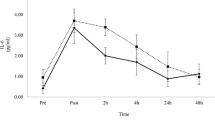Abstract
Prolonged oxidative stress is detrimental to health; however, transient oxidative stress may improve immune capability. We examined whether exercise-induced increases in the plasma oxidative generating capability enhance immune responsiveness to potential pathogens. Twelve individuals underwent a 30-min row and pre and post-exercise bloods were collected for oxidative stress and immune assessment. We found that exercise induced a transient increase in plasma carbonyls (3.2–5.3 nmol/mg protein) and creatine kinase activity (0.5–1.2 absorbance/min/mg protein) and that lipopolysaccharide (LPS) stimulation (0.5–24 h) of pre- and post-exercise blood augmented temporal tumour necrosis factor-α (TNFα) secretion. Further characterisation of plasma using a modified dihydro-2′,7′-dichlorohydrofluorescein (DCF) assay revealed that addition of a sub-threshold of hydrogen peroxide to post-exercise (and not pre-exercise) plasma caused a sixfold increase in the radical oxygen species (ROS) generating capability after 15 min (555 ± 131 to 3607 ± 488 change in fluorescent intensity [ΔFI]), which was inhibited using 60 mM N-acetyl-l-cysteine (920 ± 154 ΔFI). Furthermore, cell experiments revealed that LPS stimulation of either THP-1 cells pre-incubated with post-exercise plasma or peripheral blood mononuclear cells pre-treated with pro-oxidants, modulated the temporal secretion of key cytokines that regulate the initiation, progression and resolution of an inflammatory response. These results indicate that exercise-induced changes in plasma parameters (e.g. oxidative generating capability—dependent or independent of inflammatory mediators) augment the temporal LPS response and support the notion that repeated transient oxidative stress (such as that induced by regular exercise) is important for a “healthy” immune system.





Similar content being viewed by others
References
Aoi W, Naito Y, Takanami Y, Kawai Y, Sakuma K, Ichikawa H, Yoshida N, Yoshikawa Y (2004) Oxidative stress and delayed muscle damage after exercise. Free Radic Biol Med 37(4):480–487. doi:10.1016/j.freeradbiomed.2004.05.008
Bloomer RJ (2008) Effect of exercise on oxidative stress biomarkers. Adv Clin Chem 46:1–50. doi:10.1016/S0065-2423(08)00401-0
Bradford MM (1976) A rapid and sensitive test for the quantification of μg quantities of protein utilizing the principle of protein-dye binding. Anal Biochem 72:245–254. doi:10.1016/0003-2697(76)90527-3
Childs A, Jacobs C, Kaminski T, Halliwell B, Leeuwenburgh C (2001) Supplementation with vitamin C and N-acetyl-cysteine increases oxidative stress in humans after acute muscle injury induced by eccentric exercise. Free Radic Biol Med 31(6):745–753. doi:10.1016/50891-5849(01)00640-2
Cooper DM, Radom-Aizik S, Schwindt C, Zaldivar F (2007) Dangerous exercise: lessons learned from dysregulated inflammatory responses to physical activity. J Appl Physiol 103(2):700–709. doi:10.1152/japplphysiol.00225.2207
Deaton CM, Marlin DJ (2004) Exercise-associated oxidative stress. Clin Tech Equine Pract 2(3):278–291. doi:10.1053/51534-7516(03)00070-2
Degerstrom J, Osterud B (2006) Increased inflammatory response of blood cells to repeated bout of endurance exercise. Med Sci Sports Exerc 38(7):1297–1303. doi:10.1249/01.mss.0000227315.93351.8d
Den Broeder AA, Wanten GJA, Oyen WJG, Naber T, Van Riel PL, Barrera P (2003) Neutrophil migration and production of reactive oxygen species during treatment with a fully human anti-tumor necrosis factor-α monoclonal antibody in patients with rheumatoid arthritis. J Rheumatol 30(2):232–237
Edwards KM, Burns VE, Carroll D, Drayson M, Ringz C (2007a) The acute stress-induced immunoenhancement hypothesis. Exerc Sport Sci Rev 35(3):150–155. doi:10.1097/JES.0b013e3180a031bd
Edwards KM, Burns KM, Allen LM, McPhee JS, Bosch JA, Carroll D, Drayson M, Ring C (2007b) Eccentric exercise as an adjuvant to influenza vaccination. Brain Behav Immun 21(2):209–217. doi:10.1016/j.bbi.2006.04.158
German Society for Clinical Chemistry (1977) Standardization of methods for the determination of creatine kinase activity. Eur J Clin Chem Biochem 15:255–260
Gokhale R, Chandrashekara S, Vasanthakumar KC (2007) Cytokine response to strenuous exercise in athletes and non-athletes—an adaptive response. Cytokine 40(2):123–127. doi:10.1016/j.cyto.2007.08.006
Gomez-Cabrera M-C, Domenech E, Vina J (2008) Moderate exercise is an antioxidant: Up-regulation of antioxidant genes by training. Free Radic Biol Med 44:126–131. doi:10.1016/j.freeradbiomed.2007.02.001
Hotchkiss RS, Karl IE (2003) The pathophysiology and treatment of sepsis. N Engl J Med 348(2):138–150. doi:10.1056/NEJMra021333
Jones DP (2008) Radical-free biology of oxidative stress. Am J Physiol Cell Physiol 295(4):C849–C868. doi:10.1152/ajpcell.00283.2008
Karvonen M, Kentala K, Mustala O (1957) The effects of training on heart rate: a longitudinal study. Ann Med Exp Biol Fenn 35:307–315
Levine RL, Garland D, Oliver CN, Amici A, Climent I, Lenz AG, Ahn BW, Shaltiel S, Stadtman ER (1990) Determination of carbonyl content in oxidatively modified proteins. Meth Enzymol 186:464–478. doi:10.1385/1-59259-173-6:123
Li N, Karin M (1999) Is NF-κB the sensor for oxidative stress? FASEB J 13:1137
Matthews CE, Ockene IS, Freedson PS, Rosal MC, Merriam PA, Hebert JR (2002) Moderate to vigorous physical activity and risk of upper-respiratory tract infection. Med Sci Sports Exerc 34:1242–1248. doi:10.1097/00005768-200208000-00003
Morabito F, Tomaino A, Cristani M, Cimino F, Martino A, Minciullo PL, Calabro C, Saija A, Gangemi S (2005) Modification of the content of plasma protein carbonyl groups in donors after granulocyte colony stimulating factor-induced stem cell mobilization. Trans Aphereis Sci 33:141–146. doi:10.1016/j.transci.2005.05.003
Nieman DC (2000) Is infection risk linked to exercise workload? Med Sci Sports Exerc 32(Suppl. 7):S406–S411. doi:10.1097/00005768-200007001-00005
Nieman DC, Henson DA, McAnulty SR, McAnulty L, Swick NS, Utter AC, Vinci DM, Opiela SJ, Morrow JD (2002) Influence of vitamin C supplementation on oxidative and immune changes after an ultramarathon. J Appl Physiol 92:1970–1977. doi:10.1152/japplphysiol.00961.2001
Northoff H, Berg A, Weinstock C (1998) Similarities and differences of the immune response to exercise and trauma: the IFNγ concept. Can J Phys 76:497–504. doi:10.1139/cjpp-76-5-497
Oliver IT (1955) A spectrophotometric method for the determination of creatine phosphokinase and myokinase. Biochem J 61:116
Ostrowski K, Rohde T, Schjerling P, Pedersen BK (1999) Pro-and anti-inflammatory cytokine balance in strenuous exercise in humans. J Physiol 515(1):287–291. doi:10.1111/j.1469-7793.1999.287ad.x
Phillips MD, Flynn MG, McFarlin BK, Steward LK, Timmerman KL, Ji H (2008) Resistive exercise blunts LPS-stimulated TNF-alpha and IL-1 beta. Int J Sports Med 29(2):102–109. doi:10.1055/s-2007-965115
Rogers PJ, Tyce GM, Weinshilboum RM, O’Connor DT, Bailey KR, Bove AA (1991) Catecholamine metabolic pathways and exercise training. Plasma and urine catecholamines, metabolic enzymes and chromogranin-A. Circulation 84:2346–2356
Sachdev S, Davies KJA (2008) Production, detection and adaptive responses to free radicals in exercise. Free Radic Biol Med 44:215–223. doi:10.1016/j.freeradbiomed.2007.07.019
Soller BR, Hagen RD, Shear M, Walz JM, Landry M, Anunciacion D, Orquiola A, Heard SO (2007) Comparison of intramuscular and venous blood pH, pCO2 and pO2 during rhythmic handgrip exercise. Physiol Meas 28:639–649. doi:10.1088/0967-3334/28/6/003
Starkie RL, Ostrowski SR, Jauffred S, Febbraio M, Pedersen BK (2003) Exercise and IL-6 infusion inhibits endotoxin-induced TNFα production in humans. FASEB J 17:884–886. doi:10.1096/fj.02-0670fje
Starkie RL, Hargreaves M, Rolland J, Febbraio MA (2005) Heat stress, cytokines, and the immune response to exercise. Brain Behav Immun 19:404–412. doi:10.1016/j.bbi.2005.03.005
Vassilakopoulos T, Karatza MH, Paraskevi K, Kollintza A, Zakynthinos S, Roussos C (2002) Antioxidants attenuates the plasma cytokines response to exercise in humans. J Appl Physiol 94:1025–1032. doi:10.1152/japplphysiol.00735.2002
Vider J, Lehtmaa J, Kullisaar T, Vihalemm T, Zilmer K, Kairane C, Landor A, Zilmer M (2001) Acute mmune response in respect to exercise-induced oxidative stress. Path Physiol 7:263–270. doi:10.1016/S0928-4680(00)00057-2
Wang H, Joseph JA (1999) Quantifying cellular oxidative stress by dichlorofluorescein assay using microplate reader. Free Radic Biol Med 27(5–6):612–616. doi:10.1016/S0891-5849(99)00107-0
Wood JA, Davis JM, Smith JA, Nieman DC (1999) Exercise and cellular innate immune function. Med Sci Sports Exerc 31(1):57–66. doi:10.1097/00005768-199901000-00011
Zhang H, Park Y, Wu J, Chen X, Lee S, Yang J, Dellsperger KC, Zhang C (2009) Role of TNFα in vascular dysfunction. Clin Sci 116:219–230. doi:10.1042/CS20080196
Acknowledgments
We thank the individuals who agreed to participate in this study. Thanks also to Robyn Wells, Steve Payne and Kim Lo for their technical support, plus Drs Margot Skinner and Jeff Greenwood for their constructive advice in the writing of this manuscript. This work was funded by The New Zealand Institute of Plant and Food Research Ltd. The authors declare that the human and cell experiments comply with the current laws of New Zealand and was approved by The Northern Ethical Regional Committee (Region Y), Hamilton, Waikato, New Zealand (NTY/07/10/106). Furthermore, the human exercise trial was registered with the Australian New Zealand Clinical Trials Registry (# ACTRN12608000317392).
Conflict of interest statement
The authors declare that they have no conflict of interest.
Author information
Authors and Affiliations
Corresponding author
Rights and permissions
About this article
Cite this article
Hurst, S.M., Lyall, K.A., Hurst, R.D. et al. Exercise-induced elevation in plasma oxidative generating capability augments the temporal inflammatory response stimulated by lipopolysaccharide. Eur J Appl Physiol 107, 61–72 (2009). https://doi.org/10.1007/s00421-009-1099-1
Accepted:
Published:
Issue Date:
DOI: https://doi.org/10.1007/s00421-009-1099-1




